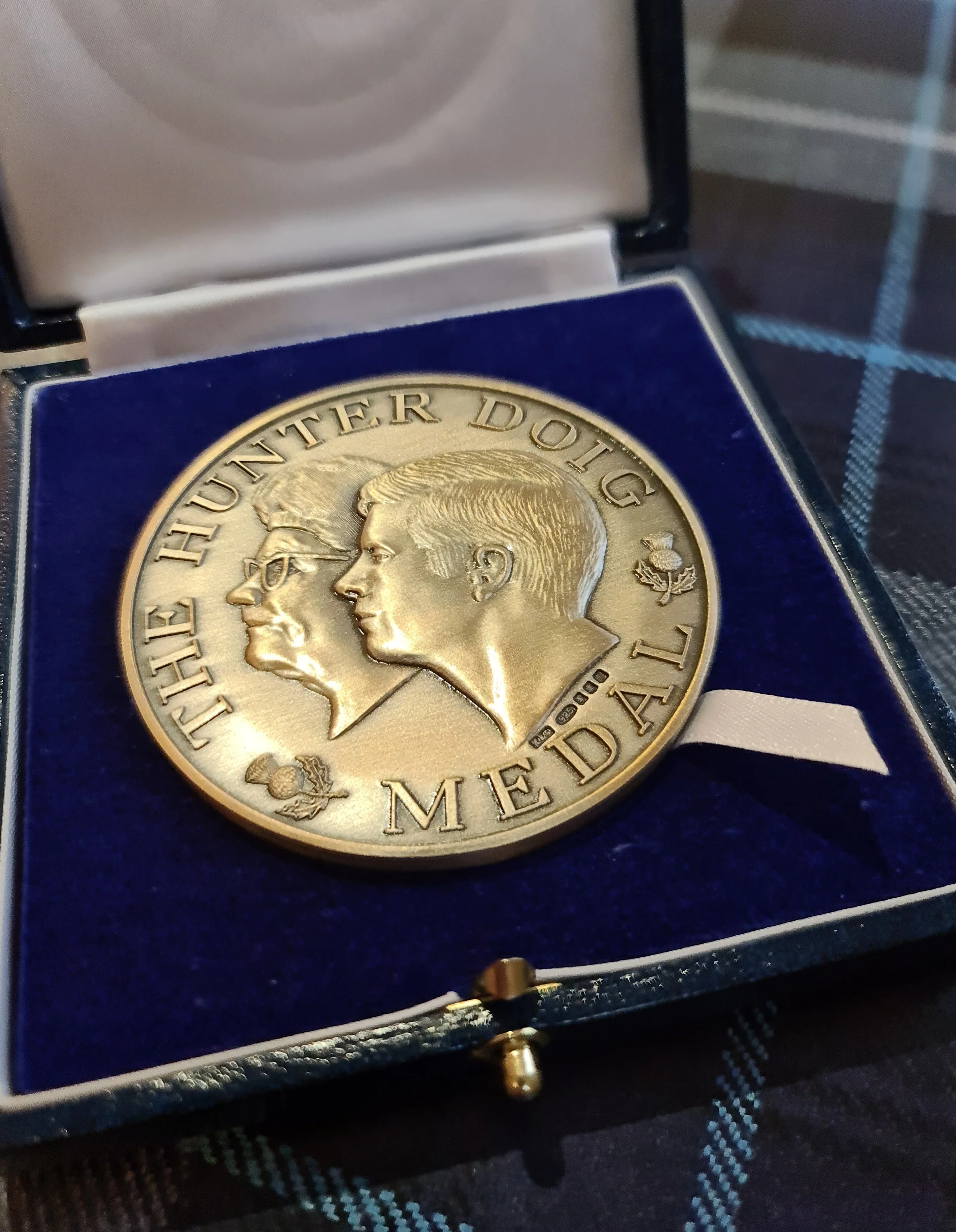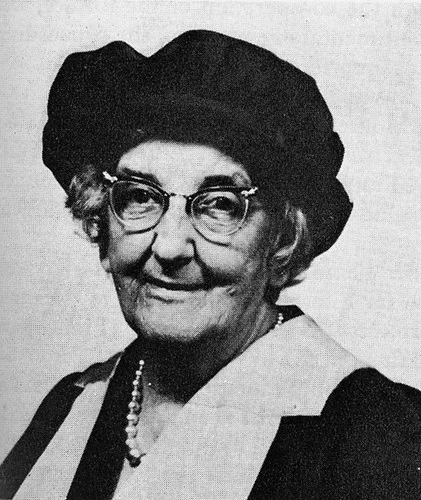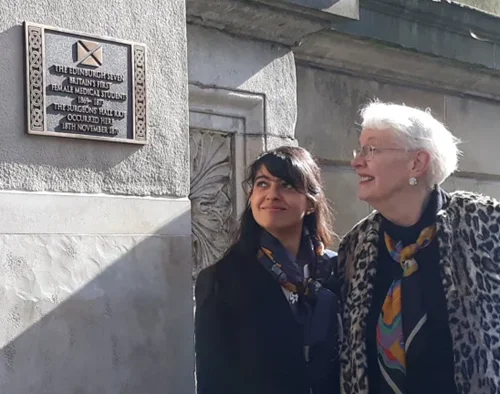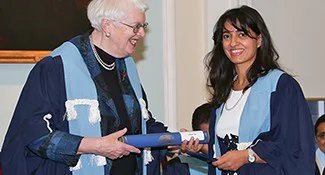Surgeons' Hall Museums Curator Louise Wilkie highlights the remarkable surgeons behind the Hunter Doig medal, and the value of this esteemed award.
In January, the College announced the opening of applications for the Hunter Doig award. This is the ninth instalment of the award, which began in 2007. The Hunter Doig medal is awarded every second year to a female Fellow or Member of The Royal College of Surgons of Edinburgh to recognise excellence within the female membership

The Hunter Doig Medal
The medal is named after two female surgeons, both of whom achieved something no woman had before.
Alice Mabel Headwards Hunter

Hunter is for Alice Mabel Headwards Hunter, who was the first woman to become a Fellow in 1920. She was born in India and returned there to practice after receiving her diploma, caring mainly for women and children. During the war she set up a convalescent home for British soldiers and assisted with wounded causalities and refugees. In 1943 in reaction to the Bengal famine, at the request of the Bengal Government she set up a temporary hospital for starving children, caring for more than 400 at a time. After the war her services were recognised by the Indian government, with the award of the Kaiser-i-Hind medal which was presented to her by the Governor of Bengal. In 1946, she was made an honorary life member and Serving Sister of the St John’s Ambulance Association. After assisting refugees as the result of Indian Independence she retired to Ireland in the 1950's.
She was honoured by the Royal College of Surgeons of Edinburgh in 1970 to celebrate the 50th anniversary of becoming the first female Fellow. The writer of Dr Alice Hunter’s obituary in the British Medical Journal wrote:
Dr Hunter’s passing represents the departure of a person of significant ability and outstanding social conscience who made her mark on every part of the medical scene she found herself in.
From this summary of her work and life, I think we can agree she was a remarkable woman and a truly fitting name to bestow upon a prestigious award to recognise excellence of women in surgery.
Caroline Doig

Doig is named for Miss Caroline Doig who, 64 years after Hunter, received her FRCSEd. Doig became the first woman elected to Council at The Royal College of Surgeons of Edinburgh in 1984. She gained her Fellowship in 1967, when there were only nine female surgeons in the UK. That equalled one woman to every 100 male surgeons, and seven of these female surgeons, like Caroline Doig, were paediatric surgeons - paediatrics was one of the few specialities open to women at this time. Miss Doig in her autobiography talked of the extensive barriers to women in surgery during her early career, including struggles to get posts. She even considered changing her CV name to C. Doig in the hope that it might be mistaken for Charles, and she might at least be called to interview and given a chance.
Born in Forfar in 1938, Miss Doig was a graduate of St Andrews University and started her surgical training in Dundee. In Glasgow her paediatric training begun, and this continued in London’s Great Ormond Street Hospital for Sick Children. She became a senior lecturer in paediatric surgery at Manchester University in 1975, and as Consultant Paediatric Surgeon worked in the surgical units at Booth Hall Hospital for Children and St Mary’s Hospital, both in Manchester, becoming one of the most respected surgeons in Britain. She then made history again, becoming the first woman chair of a major committee on the General Medical Council.
Images from Caroline Doig's autobiography
Miss Doig was dedicated to advocating for women in surgery, and became President of the Medical Women’s Federation, a body created in 1917 to promote women in medicine and campaign for women’s health issues. Miss Doig was very active in the College throughout her career and particularly during her retirement, and in 2018 she unveiled a plaque which commemorates the Edinburgh Seven and the Surgeons’ Hall Riot which took place on 18th November, 1870. The riots were in protest of the Edinburgh Seven sitting an anatomy exam. The Edinburgh Seven, including Sophia Jex-Blake, were the first women admitted to Edinburgh University in 1869. Despite passing the exams, they were eventually barred from graduating.
During the unveiling, Miss Doig stated:
I was the first woman appointed to the Council of the Royal College of Surgeons of Edinburgh in 1984. Today, the College celebrates the role of women in all its committees and activities, and its growing female membership has reached over 5,000 surgical and dental professionals worldwide. I am delighted there are now so many women pursuing a career in surgery and it is an honour to unveil this commemorative plaque on International Women’s Day, in memory of the first seven women to be admitted on to a degree programme at any British university.

Farhat Din and Caroline Doig at the plaque unveiling
This plaque was unveiled by both Miss Doig and Farhat Din, who was then a Younger Fellows’ Group Committee Member and had been awarded the Hunter Doig medal in 2015, presented by Doig herself. Professor Farhat Din was recently appointed to Council, taking her seat in 2023, some 39 years since Doig first took her seat. The Council today has five women representatives, and history was made again in 2022 when Ms Clare McNaught became the first woman to be appointed as Vice-President.
From Caroline Doig’s autobiography:
There were no role models for me when I started out, but throughout my working life, I acted as such for many girls who came to me for advice - and perhaps more who had became aware of the existence of a female surgeon.
I had the honour of meeting Miss Doig in 2018, and one of the things she was most excited about was the increasing representation of women in all aspects of surgery and leadership which she had witnessed in recent years. In her autobiography she explained that there were no female mentors when she started her career, but that she had worked hard to become that for those entering a career in surgery, becoming a visible example of success for other women in the field. Having her name associated with an award which recognises women in surgery was something that gave her much pride.
Alice Hartley, who accepted the award in 2018:
I feel incredibly honoured to receive this medal and I will ensure that I try to support and mentor the female surgeons of the future in the same vein.
I think everyone would agree the names of Hunter and Doig are most befitting of such a prestigious medal, not only for the incredible work they undertook but for the advancements they made for women in surgery.
The Hunter Doig Award

Farhat Din with Caroline Doig in 2015
The medal is awarded to a surgeon who, in the opinion of Council, has shown career potential and ambition, as well as high standards in terms of good surgical practice, clinical excellence, ongoing contribution to education and training, clinically based research and audit and or laboratory research of direct clinical relevance. Professor Farhat Din wrote in 2015 of what the award meant to her:
I was really overwhelmed to receive the Hunter Doig medal, especially as Miss Doig herself was there to present it. I feel truly privileged and grateful to be a surgeon. It is absolutely fantastic to be recognised by the Royal College of Surgeons of Edinburgh as having made a contribution to surgery, science and training at this early stage in my career. We need surgeons for the future, and it is critical that surgery be an attractive career choice for both men and women.
Hunter Doig Recipients
Nominations and applications for this year’s award will be considered by the Awards Committee in June, with a decision being ratified by Council. With the acceptance of the applicant an announcement could be expected in July. The deadline for submissions is Friday 10 May 2024. Find out more about the Hunter-Doig award, including on how to self-nominate.



